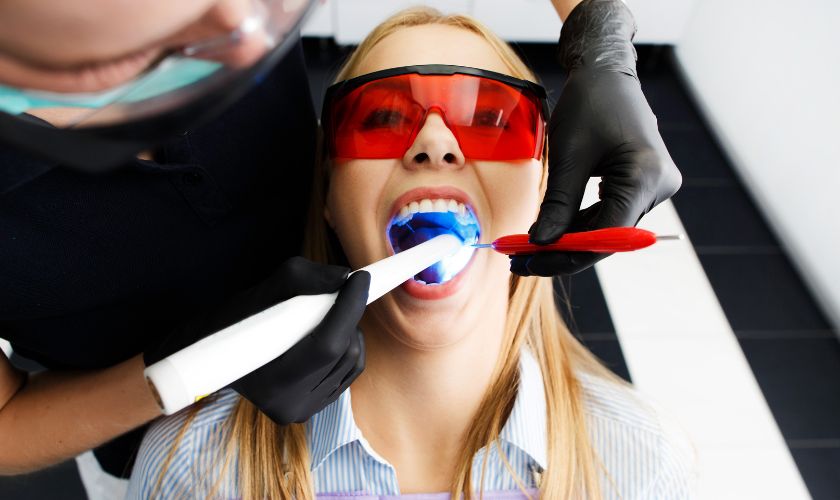(703) 372-5665
Tips to Tips to Help Your Child Develop Good Oral Hygiene Habits

Tips to Tips to Help Your Child Develop Good Oral Hygiene Habits
Good oral hygiene habits are essential for maintaining a healthy smile and preventing dental problems. As parents, it’s our responsibility to teach our children good oral care practices from an early age. But let’s face it – getting kids excited about brushing their teeth can be quite a challenge! That’s why we’ve put together some tips to help you make oral hygiene fun and easy for your little ones. Read on to discover how you can turn toothbrushing into a fun activity that your child will enjoy!
The Importance of Good Oral Hygiene
Good oral hygiene is important for a multitude of reasons. Firstly, it helps to prevent tooth decay and gum disease. These dental conditions can cause pain, discomfort and even lead to tooth loss if left untreated. Regular brushing and flossing remove plaque, a sticky film of bacteria that forms on teeth and gums. The longer plaque stays on teeth, the more likely it will harden into tartar which can only be removed by a dentist.
Secondly, good oral hygiene also promotes fresh breath – nobody likes bad breath! Brushing your child’s tongue along with their teeth can help remove any odor-causing bacteria lurking in their mouth.
Thirdly, maintaining good oral care habits from an early age sets your child up for a lifetime of healthy smiles. It also instills responsibility as they grow older to take care of themselves independently.
Teaching your children good oral hygiene practices is essential not just for their physical health but also for their self-confidence and overall well-being.
How to Teach Your Child Good Oral Hygiene Habits
Teaching your child good oral hygiene habits is an important aspect of their overall health and well-being. Starting early is key to developing good dental habits that will last a lifetime. Here are some tips on how to teach your child good oral hygiene habits.
Lead by Example: Children often learn by watching and mimicking their parent’s behavior, so make sure you practice good oral hygiene yourself. Brush and floss with your child, and let them watch as you do it correctly.
Make It Fun: Oral care doesn’t have to be boring or a chore for kids. Get creative with fun toothbrushes, flavored toothpaste, and even sing songs or play games while brushing.
Create a Routine: Establishing a regular routine helps children understand the importance of consistent dental care. Set specific times each day for brushing your teeth (after breakfast and before bed) to create structure around this healthy habit.
Explain Why It’s Important: Help your child understand why taking care of their teeth is essential for their overall health, not just keeping cavities away but also maintaining gum health which could lead to other problems if neglected.
Talk About Consequences: It’s crucial that children grasp the consequences of poor oral hygiene such as bad breath, yellowed teeth or even losing teeth due to decay in later life because they didn’t take sufficient care when young
Incorporating these simple steps into daily routines can help instill lifelong healthy dental habits in children from an early age making the future brighter!
What Foods to Avoid When Teaching Good Oral Hygiene Habits
When teaching good oral hygiene habits to your child, it’s not only important to focus on brushing and flossing but also on their diet. The foods they eat can have a significant impact on their dental health. Here are some foods that you should avoid when trying to teach good oral hygiene habits.
Sugary Foods: Sugary foods such as candy, cookies, cakes, and soda should be avoided as much as possible. These types of food can stick to the teeth and create an environment for harmful bacteria to thrive in the mouth. It’s better to replace sugary snacks with healthier options like fruits or vegetables.
Sticky Foods: Sticky foods like caramel and gummies can get stuck in between teeth which makes them harder to remove during regular brushing sessions. This can lead to cavities over time if not taken care of properly.
Acidic Foods: Acidic foods such as citrus fruits and juices may be healthy for overall health but are not so great for dental health. The acid present in these types of food erodes tooth enamel leading to sensitivity issues later on.
Carbonated Beverages: Carbonated beverages like soda contain acids that cause erosion of tooth enamel over time leading up to tooth decay if consumed regularly.
By limiting excessive sugar intake from candies & other sweets along with carbonated drinks topped with acidic content one could help prevent a host of potential problems down the road related to both dental & overall general wellbeing aspects involving children’s lives alike!
The Bottom Line
Good oral hygiene habits are a crucial part of maintaining overall health and well-being. As parents, it is our responsibility to teach and encourage our children to practice good oral hygiene from an early age. By implementing the tips outlined in this article such as establishing a routine, making it fun, leading by example, and avoiding certain foods, we can set our children up for a lifetime of healthy teeth and gums.
Remember that developing good oral hygiene habits takes time and patience. It may take some trial and error before finding what works best for your child’s individual needs. But with persistence and consistency, these practices will become second nature to them.
By investing in your child’s dental health now, you’re giving them the tools they need for a brighter smile tomorrow!






